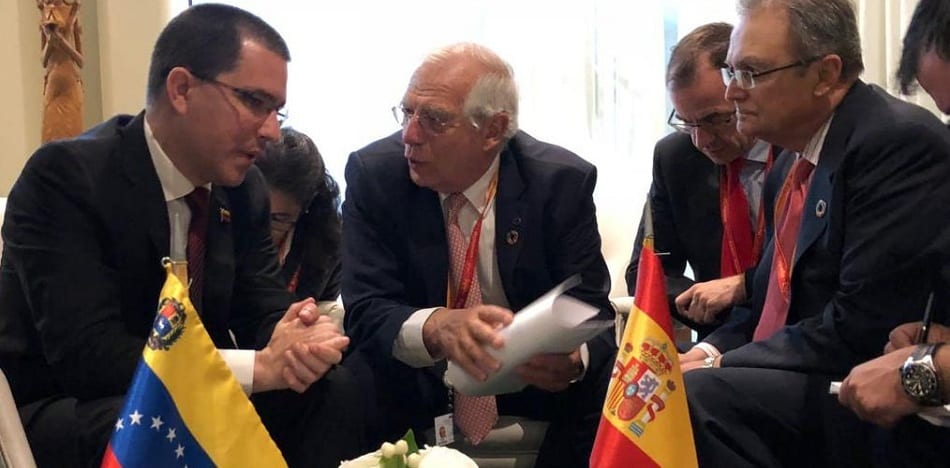The government of Spain appears increasingly prone to display its socialist nature and above all demonstrate its affinity to the regime of Nicolás Maduro. The European country went from having a government that fought against the dictatorship in Venezuela, to having one that is lukewarm in its position.

The position of the government of Prime Minister Pedro Sánchez has become a “push and pull”. On the one hand, Foreign Minister Josep Borrell assures that he will apply a policy of facilitating dialogue in Venezuela, but later assures that he will not abandon sanctions against the Maduro regime.
In the same way, he assured that Maduro’s legitimacy as president will last until January 10, 2019, but later he assured that Spain’s relationship is with states and not with governments.
International relations expert Mariando de Alba said that the Spanish government’s position creates a dangerous precedent:
“We have to be careful about thinking that January 10, 2019 suddenly changes the scenario and the regime of Nicolás Maduro could fall. Yes, it is an opportunity to seek to increase the pressure – internal and external – but it does not substantially differ from the current scenario (…) For example, the Foreign Minister of Spain talks about the illegitimacy of Maduro after January 10, 2019, but immediately says ‘we do not recognize governments, we recognize states’, taking away practical value from their declaration,” he said.
In Alba’s mind, governments do not need to wait until January 2019 to increase the pressure on Venezuela, since Maduro was sworn in before an illegal Constituent Assembly, and in his eyes he has lost all legitimacy.
“Let’s not forget that the May 24, 2018 “swearing in” of Maduro for the 2019-2025 period to the National Constituent Assembly was illegitimate, so the perpetrated fraud and illegitimacy of the regime has been clear for months…At the end of the day, the international non-recognition is what can lead to greater sanctions, and reduction or suspension of relations, measures that would also be possible today. Internationally it will also be important who “controls” the territory, even if it is de facto,” he concluded.
And Borrell’s statements are not the only ones that have revealed the fragility with which Spain will now deal with the Maduro dictatorship, since it was also known that President Sánchez will travel to Cuba in November. This would represent a kind of recognition of the dictatorship of the island; the same type of recognition that currently keeps Maduro in power.
After said meeting was announced, a representative of the government of the United States recommended that the Spanish president take advantage of his visit to Cuba to promote democracy, as well as to criticize the interference of the island in Venezuela’s internal affairs.
“Any country that is interested in democracy should ask and pressure the Cuban government to democratize,” he said.
It seems that the new position of Spain will be similar to that of the government of Uruguay: lukewarmness while the dictatorship in Venezuela represses its people and plunges the country into an unprecedented humanitarian crisis. Like Uruguay, Spain does not believe it necessary to investigate the crimes against humanity committed by the Maduro regime.
In fact, one of the few reactions in favor of the “Spanish proposal” to promote a dialogue was that of Uruguayan Foreign Minister Rodolfo Nin Novoa, who said: “We were very pleased to feel out the Spanish proposal on the subject Venezuela in order to create a group that encourages dialogue, (and) not so much conflictive rhetoric,” he said.
But Spain and Uruguay would be supporting a fifth attempt at dialogue in Venezuela, when under no circumstances the Maduro regime has shown intentions to conform with any of the commitments already made. The dictatorship keeps hundreds of political prisoners and commits crimes against humanity on a daily basis, which the same Spanish government is not willing to denounce before the International Criminal Court (ICC).
With the request for dialogue and no support for the lawsuit against Maduro in the ICC, what the Sanchez government does is give the Maduro dictatorship room to stay in power and continue committing crimes against humanity.
Just as Spain has a new government of socialist nature and Uruguay refuses to apply international pressure on Venezuela, everything indicates that the same will happen with Mexico when the socialist Andrés Manuel López Obrador (AMLO) assumes power.
It is hoped that the rest of the countries of the region will maintain the firm conviction of continuing to press the dictatorship of Venezuela with new sanctions and international measures with which the exit of the Maduro regime can be achieved. For its part, the European Union has already made it clear that it will not soften its position on Venezuela.













